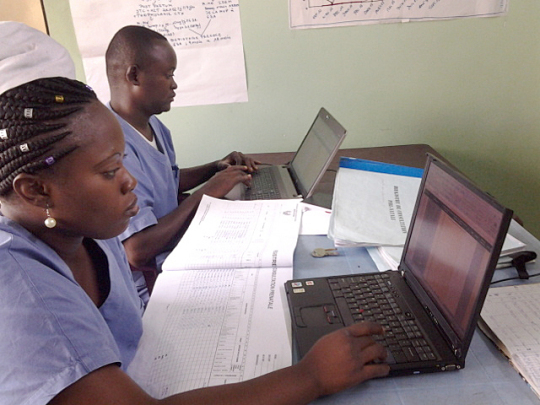Digital Health at Scale: Getting Beyond Pilot Projects
By Kate Wilson, Director of Digital Health Solutions, BID Initiative
Dec 9, 2014
Posted in People, Practices, Products

Nurses manage HIV patient data in a clinic in the Democratic Republic of Congo. Photo: PATH/Yori Matumona.
“The Journey to Scale“, an mHealth paper, will be presented this week at the mHealth Summit. The BID Intiative is cited as an example of bringing efficiencies to country-wide health systems (Repost from the PATH blog).
It took almost 20 years for barcodes to be fully adopted across the grocery industry. Today they’re in use worldwide, delivering efficiency and automation on a massive scale.
It took the efforts of a dedicated visionary to show the impact that a single, universal-sized shipping container would bring to the trucking and freight industry. Today, shippers around the globe can be sure that a standard-sized container will fit on the truck that delivers it to the port in Mombasa and on the truck that unloads it in Seattle.
In a paper being released this week by PATH, commissioned by the Bill & Melinda Gates Foundation, we describe the journey our global community needs to take to shift the use of digital tools for health from a series of one-off projects to an institutionalized common practice—much like grocery barcodes and shipping containers impacted their industries’ common practices.
Using these examples as case studies, we discuss how we can move past an era of small-scale pilots, towards more comprehensive efforts that align systems and allow for much larger-scale impact.
Changing how we think about scale
We often use “going to scale” in development efforts as a goal for moving projects beyond the pilot phase. Yet despite a decade of investment, there are only a handful of “scaled” digital health interventions to count, and no single shared definition of scale.
We believe a digital product or service can only be considered successful after it’s become embedded into a health system workflow or an individual’s daily habits.
This embedding or “institutionalization” of digital health solutions is the end goal we focus on in our report, one we hope becomes more broadly shared. When a digital innovation becomes institutionalized, discussions of mHealth and eHealth will cease and our focus will simply be on health impact.
Can you imagine an entrepreneur anywhere in the world considering opening a grocery store without bar code equipment? That level of institutionalization is also possible with digital health solutions, but our stakes are much higher than groceries: we have the potential to save lives, while bringing efficiencies to health systems that could most benefit from savings.
What if automatic reminders could be sent to caregivers or community health workers notifying them when a child is due for vaccines? And what if that system integrated the local availability of vaccines and immunizations? Furthermore, what if suppliers used barcodes so health officials could track and efficiently distribute stock?
PATH’s Better Immunization Data (BID) Initiative is one example of bringing efficiencies to country-wide health systems. Supported by a grant from the Bill & Melinda Gates Foundation, the BID Initiative will help countries strengthen their immunization programs through improved data quality, collection, and use by identifying practical, country-owned, country-led digital health solutions.
We are emerging from a period marked by great enthusiasm and innovation in digital health, but one with a very fragmented landscape of hundreds of small digital health pilot projects.
Moving towards consensus in 2015
Of those, a very small proportion, fewer than 1 percent, have gone to scale or achieved institutionalization.
However, our digital health community is rich with creative, persistent, and passionate innovators who recognize that “it is not about us, it is not about technology, it is not about money, it’s about impact.”
Consensus is emerging among donors and governments that digital health institutionalization is the outcome we collectively seek, as well as a willingness to share the journey together. Now is the time for us to pause in our individual journeys, assess the current landscape, and align on a common path forward.
Editor’s note: guest contributor Kate Wilson, director of Digital Health Solutions at PATH, announces the release of a new paper at this week’s Global mHealth Forum.

